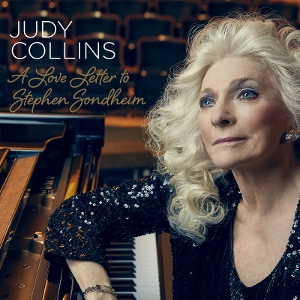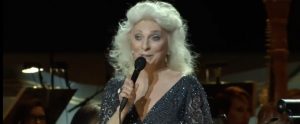THIS PRETTY WOMAN IS A WONDER
She was just nominated for a Grammy for the folk album Silver Skies Blue (a collaboration with singer-songwriter Ari Hest); last year, she headlined a PBS special A Love Letter to Stephen Sondheim, and is releasing a CD this week with extra material not on the special; she’s currently on tour, and regularly appears at 50-80 venues a year; she’s about to publish her 10th book; she’s now at work with Stephen Stills on another special; she writes almost every day; and—based on the talk I had with her—it’s incomprehensible that the indefatigable Judy Collins will be 78 in May. I caught her in L.A. where she’s staying at the Four Seasons for a few days before she heads back on the road. But she’ll return here on Saturday March 18, 2017 at the La Mirada Theatre, her only Southland stop this tour.
https://www.youtube.com/watch?v=jpG5FDAE7ow
Upbeat, lucid, engaging, and energetic, the folk music icon with a career that spans over 55 years and as many albums is known for more than music. The social relevance of her material, her activism, and her openness about her recovery from alcoholism and her son Clark’s suicide at age 33 have all made headlines.
Collins is legendary for having thrust the limelight onto little-known artists by recording their songs, her most famous being “Suzanne” in 1966, released months before Leonard Cohen’s original hit shelves, and “Chelsea Morning,” which hit the airwaves before Joni Mitchell’s own turn in 1969. She very much influenced other artists, including Chris Williamson. She also gave Broadway composer Stephen Sondheim his biggest hit.
Collins still looks amazing—her trademark blue eyes continue to glimmer like jewels—and her soprano voice remains as crystalline as her orbs. When I began my next question about her vitality, “But as you get older—“, she stopped me with, “I’m not getting older. Let’s get that straight. I’ve been 37 for a long time now.” She did attribute her voice and stamina to genetics as well as a healthy lifestyle. Her lineage is Scotch/Irish which makes sense given that her debut album, A Maid of Constant Sorrow, contained selections ranging from the Scottish anthem “Wild Mountain Thyme” to the Irish standards “Bold Fenian Men” and “The Prickilie Bush.”
Her family came to this continent very early, no doubt living out a hardscrabble existence. The English side of her family “came back in the 1640s with William Penn, and the Irish came in the 1730s, probably from Belfast, so they’ve … been Americanized for some time.” But if they arrived now, “they’d all be deported by Trump.” (I was fascinated how she displayed a far greater sense of humor in conversation than on her recordings.)
“Active” is the key word with Collins, elucidated by the familial varietals in her system: “We had farmers, we had singers, we had shopkeepers, and we had awfully good chefs.” Her lineage no doubt explains her deep-seated activism as well. “They ran away from the repression of other countries, so it’s in the blood. I was raised to be an activist.” She was also introduced to music by her dad, who hosted and sang on radio: “I was performing at the time I was four when my father put me on stage in Butte, Montana singing Christmas songs. Of course, it was April.”
 Though defined early on as a folksinger, Collins was tackling theater music in orchestral settings as early as her In My Life album (1966). Recording Sondheim, as most people know, is not unchartered territory for Collins, whose 1975 cover of “Send in the Clowns” won a Song of the Year Grammy for the composer/lyricist of A Little Night Music. In 1979, the (then) rarely recorded “I Remember Sky” (from Evening Primrose) was on her album Hard Times for Lovers. A year later in 1980, she interpreted two songs from Sweeney Todd on Running for My Life. She was not only one of the first artists to cover any songs from that 1979 musical, but notice the selections: She dared to sing an ode to “Pretty Women” (which could have been misinterpreted as a coming out song) and “Green Finch and Linnet Bird,” a song for coloratura soprano voice, on a pop album. It is due to Collins’ classical training that she evolved from a pop star into an internationally acclaimed singer of art songs and show tunes.
Though defined early on as a folksinger, Collins was tackling theater music in orchestral settings as early as her In My Life album (1966). Recording Sondheim, as most people know, is not unchartered territory for Collins, whose 1975 cover of “Send in the Clowns” won a Song of the Year Grammy for the composer/lyricist of A Little Night Music. In 1979, the (then) rarely recorded “I Remember Sky” (from Evening Primrose) was on her album Hard Times for Lovers. A year later in 1980, she interpreted two songs from Sweeney Todd on Running for My Life. She was not only one of the first artists to cover any songs from that 1979 musical, but notice the selections: She dared to sing an ode to “Pretty Women” (which could have been misinterpreted as a coming out song) and “Green Finch and Linnet Bird,” a song for coloratura soprano voice, on a pop album. It is due to Collins’ classical training that she evolved from a pop star into an internationally acclaimed singer of art songs and show tunes.
https://www.youtube.com/watch?v=PtZeW9wfqgo
I wondered what brought her back to Sondheim now. She told me she never left him: “Oh, I’ve been working on this idea for about 25 years. I just finally got a green light from PBS. She has not done another album covering one Broadway composer, but in 1999, she worked with a frequent Sondheim orchestrator, Jonathan Tunick, on Classic Broadway. “He doesn’t write easy songs, as you probably know. I wanted to give them a kind of a welcome musically that I gave ‘Send in the Clowns’ and I’m hoping to make them as accessible as that song.”
Even though the Sondheim CD is now available, don’t expect an all-Sondheim evening on her current tour. Sure, you’ll hear some, but her set list is ever fluctuating. Look for “a lot of surprises, including some brand new stuff.” And how does this living legend, this ever-ready bunny of pop, wrap everything up? “That’s my story and I’m sticking to it.”
Judy Collins
La Mirada Theatre for the Performing Arts
Saturday, March 18 at 8:00
for tickets, call 562.944.9801 or visit La Mirada Theatre
for other tour dates / cities and CD info, visit Judy Collins

